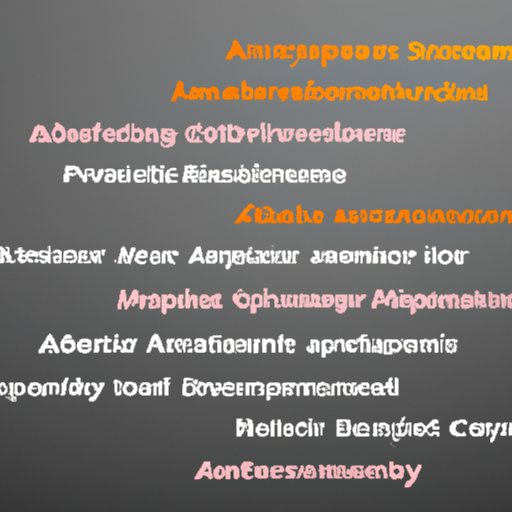Introduction
An Associate in Science (AS) degree is a two-year program designed to equip students with the knowledge and skills necessary for a variety of careers. This type of degree is a great option for those who are looking for an affordable and flexible way to pursue a career in science. In this article, we’ll explore the benefits of an AS degree, examine the curriculum, and look at some common career paths.

Overview of Associate in Science Degree Programs
An Associate in Science degree focuses on providing students with foundational knowledge in the sciences. This includes courses in biology, chemistry, physics, mathematics, and other related fields. Depending on the school and program, students may also have the opportunity to take elective courses in specialty areas, such as environmental science or computer science.
Most AS degree programs are designed to be completed in two years or less. This makes them an ideal choice for those who need to balance work and family obligations with their studies. Additionally, many schools offer online or hybrid programs, which allow students to complete their coursework from the comfort of their own home.

Exploring the Benefits of an Associate in Science Degree
The primary benefit of an Associate in Science degree is that it provides students with a solid foundation in the sciences. This foundation can then be used to pursue a variety of career paths, from healthcare to technology to business. Additionally, an AS degree is an affordable and flexible way to get started in a career in science.
According to the National Center for Education Statistics, “students who earn an associate degree typically receive higher salaries than those with only a high school diploma.” Furthermore, research has shown that those with an associate degree are more likely to be employed and less likely to be unemployed than those with only a high school diploma.

Examining the Curriculum for an Associate in Science Degree
The curriculum for an Associate in Science degree will vary depending on the school and program. Generally speaking, most programs include core requirements in the sciences, such as biology, chemistry, and physics, as well as math courses such as calculus and statistics. Students may also have the opportunity to take elective courses in specialty areas, such as environmental science or computer science.
In addition to coursework, students may also participate in lab work, field trips, and research projects. These activities provide students with the opportunity to learn hands-on skills and gain a deeper understanding of the material they are studying.
Common Career Paths with an Associate in Science Degree
An Associate in Science degree provides a strong foundation for a variety of career paths. Here are some of the most common:
Healthcare
Those with an AS degree in science can pursue a career in healthcare, such as nursing, medical assisting, or even physical therapy. According to the Bureau of Labor Statistics, these occupations are expected to grow faster than the average for all occupations between 2018 and 2028.
Technology
Science degrees can also lead to careers in technology, such as software engineering or robotics. With the increasing demand for technology professionals, those with an AS degree in science can find plenty of opportunities in this field.
Business
An AS degree in science can also provide a foundation for a career in business. Those with a background in science can pursue roles in finance, marketing, or data analysis.
Education
Finally, those with an AS degree in science may choose to pursue a career in education. This could include teaching at the elementary, middle, or high school levels, or even working as a professor at a college or university.
How to Choose the Right Associate in Science Program
Choosing the right Associate in Science program can be a daunting task. Here are some tips to help you make the best decision:
Consider Your Interests
Before choosing a program, it’s important to consider your interests. Are you interested in healthcare? Technology? Business? Education? Knowing what you want to do after graduation can help you narrow down your options and focus on the programs that are best suited to your goals.
Research the Program Requirements
Once you’ve identified some potential programs, it’s time to do some research. Look at the curriculum and find out what types of courses are required. Consider the length of the program, the cost, and any available financial aid options.
Look at the Job Prospects
It’s also important to consider the job prospects for each program. Look at the types of jobs that graduates typically go into and the salary range for those jobs. This can help you determine if the program is worth the investment of time and money.
Compare Costs and Financial Aid Options
Finally, it’s important to consider the cost of the program and any available financial aid options. Many schools offer scholarships, grants, and loans to help cover the cost of tuition and other expenses. Researching these options can help you make an informed decision about which program is right for you.
Conclusion
An Associate in Science degree can be a great way to pursue a career in the sciences. It provides a solid foundation in the sciences and can lead to a variety of career paths, including healthcare, technology, business, and education. Choosing the right program is important, so be sure to consider your interests, research the program requirements, look at the job prospects, and compare costs and financial aid options before making a decision.
(Note: Is this article not meeting your expectations? Do you have knowledge or insights to share? Unlock new opportunities and expand your reach by joining our authors team. Click Registration to join us and share your expertise with our readers.)
